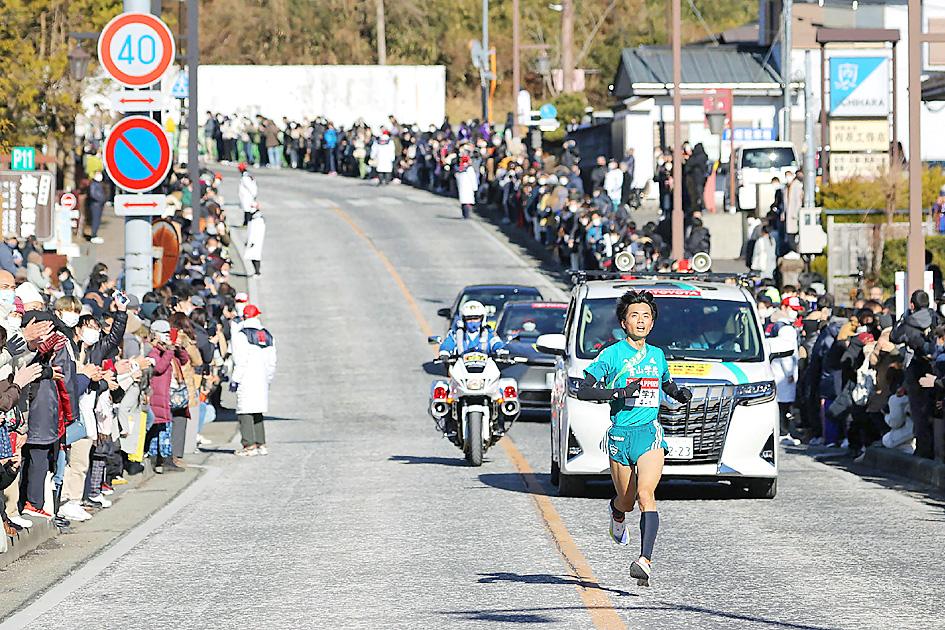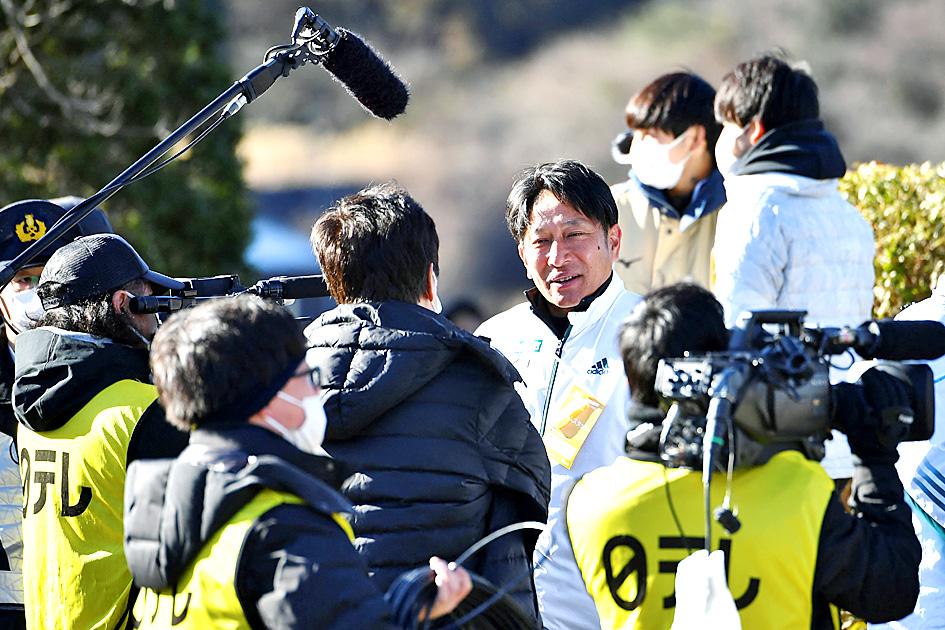The long-distance road-running relay sport of ekiden is a national institution in Japan, where New Year’s races command massive TV audiences and turn unknown athletes into overnight stars.
Now ekiden’s greatest modern coach believes it can also become a global event on the Olympic stage — and even contribute to world peace.
Ekiden involves teams of runners covering long-distance relay stages of varying lengths, and has been held in Japan for more than a century.

Photo: AFP
The event took its inspiration from the samurai-era couriers who carried messages between Tokyo and the former imperial capital, Kyoto.
Ekiden is virtually unknown outside of Japan, but Susumu Hara, head coach of the all-conquering Aoyama Gakuin University team, believes it can become popular around the globe.
“Connection, is a word that resonates throughout sports around the world,” he said. “A lot of places still have social conflict, but connecting people like we do in ekiden can play a part toward world peace.”

Photo: AFP
The sport’s flagship race is the Hakone Ekiden, contested by 21 university teams over two days on Jan. 2 and 3 each year.
Races for professional teams also exist, but it is the student event that really captures the public’s attention, with millions watching on TV and more lining roads along the route.
Each of the teams’ 10 runners completes a section of the 217km return trip between Tokyo and the resort town of Hakone, handing over a colored sash to their teammate at each checkpoint.
Like cycling’s Tour de France, stages vary in length — some are flat and others involve punishing climbs up mountain roads.
The Hakone Ekiden is open only to universities in the greater Tokyo area, but its prestige is such that students from all over Japan choose to study at schools in the capital just so that they can compete in the race.
“I used to be in my primary school baseball team, but then I watched the Hakone Ekiden with my family and I wanted to run in it, too — that’s why I took up running,” said Takayuki Iida, captain of the Aoyama Gakuin University team.
“Every time I run in the race, I want to run in it even more the next year. It really is the stuff of dreams,” Iida said.
Some people have even been known to quit their jobs and return to university so they can run again, said Takeshi Nishimoto, a journalist at Ekiden News.
He said the team nature of ekiden strikes a chord with many Japanese.
“People say the Japanese don’t have individuality, but I think one thing people like about the race is that within a team, their personalities come out,” Nishimoto said. “Having the right person in the right position is something that really resonates with Japanese people.”
Reports say last year’s race was watched on TV by almost 65 million people — the biggest audience since live broadcasts began in 1987.
For runners like Ryuji Kashiwabara, who became known as “the God of the Mountains” after helping Tokyo University win the race three times between 2009 and 2012, it can be a life-changing experience.
“People suddenly started speaking to me on the train or when I was out for dinner, and people would take pictures of me when I went back to my home town,” Kashiwabara said. “I realized it wasn’t just me thinking about what I had done — everyone was going crazy about it.”
The advent of social media has brought even more attention to today’s athletes, but their fame can be fleeting and few go on to become Olympic stars, Kashiwabara said.
Many quit running after reaching their life’s goal of competing in the Hakone Ekiden, Nishimoto said.
Others find it difficult to make the transition to the individual marathon or long-distance track events.
Hara, who coached Aoyama Gakuin University to their sixth title in eight years yesterday, would like to see ekiden included in the Olympic program one day, but first he wants to see reforms in Japan, starting by opening up the Hakone Ekiden to universities from around the country as well as professional teams.
“First we need to make sure we do it right at home,” he said.
“If we do that, a bigger effort to take it to the Olympics and make it a global event will follow as a matter of course.”

Barcelona star Lamine Yamal would be motivated by criticism ahead of the Clasico, Barcelona assistant coach Marcus Sorg said yesterday. Teenage winger Yamal has been in the spotlight in the Spanish capital after joking that Real Madrid “steal” and “complain” during an appearance on a social media stream. Champions Barca face Real Madrid today in La Liga at the Santiago Bernabeu, looking for a fifth consecutive win over their rivals. “Lamine is a top player and I think [the criticism] will be motivating for him,” Sorg told a news conference. “I hope we all see him tomorrow [give] the best performance.” The 18-year-old Spain

‘A HISTORIC moment’: ‘I think we all need to take a step back and appreciate Leo Messi is playing in Major League Soccer,’ league commissioner Don Garber said Lionel Messi raised the Golden Boot. He then got Inter Miami started with his head. The Argentine opened the scoring with a diving header in the first half, then capped the scoring in the 96th minute as Inter Miami opened the MLS playoffs with a 3-1 win over Nashville SC in Game 1 of their Eastern Conference best-of-three first-round series on Friday night. Messi and Ian Fray had the assists on Tadeo Allende’s second-half tally for Inter Miami, who now get two chances to advance out of the first round for the first time in Messi’s two-and-a-half-year tenure with the team. Game

‘COMPLETE GAME’: ‘To be honest, I’m not sure about the history, but I’m very happy about what I did today,’ Yamamoto said through a translator after the game Yoshinobu Yamamoto pitched a World Series game from another era. Sandy Koufax had October outings like this, and so did Orel Hershiser, but those types of performances have vanished in modern baseball. Until this 178cm starter from Japan delivered like the aces of old. Yamamoto threw a four-hitter for his second consecutive complete game, the first in the World Series since 2015, and the defending champion Los Angeles Dodgers beat the Toronto Blue Jays 5-1 on Saturday night to tie their best-of-seven matchup at one game apiece. “It’s kind of the throwback,” Dodgers manager Dave Roberts said. “When he starts a game, he

Sean Dyche on Thursday achieved in his first game with Nottingham Forest what predecessor Ange Postecoglou could not in eight matches in charge: Win. Under its new coach, Nottingham Forest presented a concentrated display resulting in a 2-0 victory over Porto in the UEFA Europa League. It was the first victory for Nottingham in the competition and only the second overall this season, while Porto were defeated for the first time this season. Morgan Gibbs-White converted from the penalty spot in the 19th minute at the City Ground in West Bridgford, England. Igor Jesus doubled the advantage from another penalty in the 77th